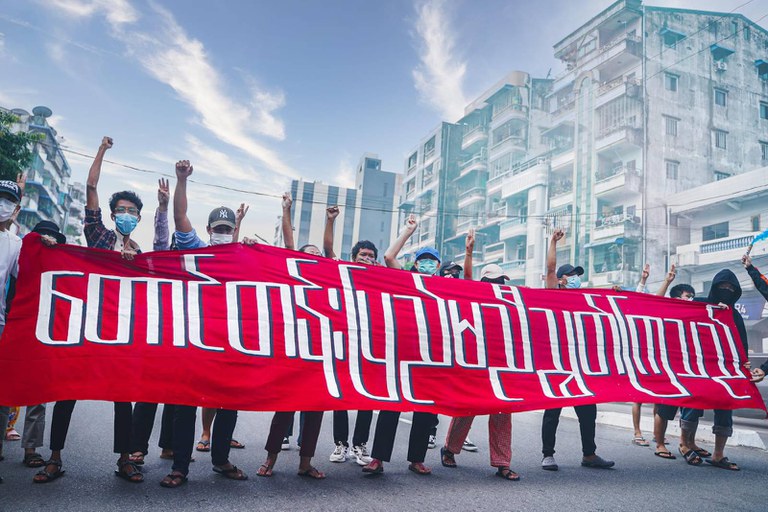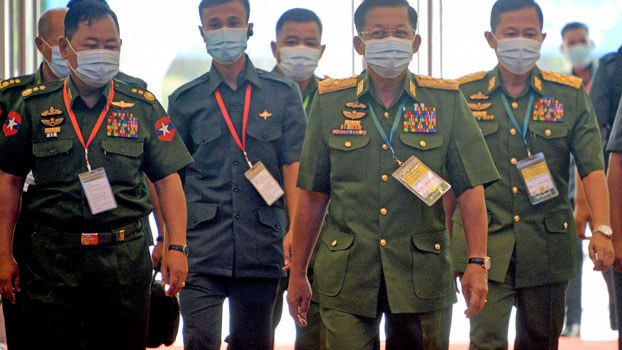Police in Phnom Penh on Tuesday arrested a Cambodian American lawyer and activist dressed as the Statue of Liberty outside a courthouse, where minutes before a mass trial ended by convicting her and more than 50 other opposition figures of treason. Theary Seng was a high-ranking member of the Cambodian National Rescue Party (CNRP) before the country’s Supreme Court dissolved the party five years ago, a decision that paved the way for Prime Minister Hun Sen to tighten his grip on the country and squash criticism of his longstanding government. Wearing a copper-patina hued flowing gown and speckled in glitter, Theary Seng stood holding the torch of liberty in one hand and a tablet reading “Paris Peace Accord, 23 October 1991” in the other, a reference to the agreement that ended civil war in Cambodia and established the Southeast Asian nation as a fledgling democracy. “I am ready for the sham verdict that will be announced this morning which will be a guilty verdict. I am ready and prepared to go to the notorious Cambodian prison for my political opinions, for my beliefs, for my belief in democracy,” she told reporters prior to the conviction. “This regime will not let me go free. It will be an unfair and unjust verdict, because I am innocent, the others charged with me are innocent. But we are living in a dictatorship, we are living in a regime that suppresses and represses its own people, that punishes, that uses the law as a weapon against its own people,” Theary Seng said. She also said that she would not enter the court during the trial. If the authorities wanted to arrest her, they would have to do it publicly, she said. Theary Seng was sentenced to six years in prison, while the others received sentences ranging from five to eight years. Among the other activists on trial Tuesday, 27 were tried in absentia, according to New York-based Human Rights Watch. The treason charges against the activists stem from abortive efforts in 2019 to bring about the return to Cambodia of CNRP leader Sam Rainsy, who has been in exile in France to avoid what his supporters say are politicized charges against him. Following the verdict, authorities obliged Theary Seng’s request for a public arrest — two police officers grabbed her and rushed her into a waiting truck, a video shows. Chhoeun Daravy, an activist who witnessed the arrest, told RFA the police truck drove her to prison. “We are deeply troubled by today’s unjust verdicts against Theary Seng and others,” the U.S. Embassy in Cambodia said in a statement posted to Facebook. “Freedom of expression and association, and tolerance of dissenting views, are vital components of democracy. “We call on Cambodian authorities to release her and other human rights activists from unjust imprisonment.” The Cambodian government’s spokesperson, Phay Siphan, told RFA’s Khmer Service that Theary Seng’s courtside demonstration had nothing to do with the verdict, and tried to dispel the idea that her conviction could damage relations with Washington. “The court’s measures are based on the law,” he said. “Cambodia and the U.S relationship is important … more important than just one person,” Phay Siphan said. Because Theary Seng is a dual citizen of Cambodia and the United States, the embassy can request that she serve her sentence in the U.S., Phay Siphan said. He also said she had the option to appeal and could also seek amnesty from Cambodia’s king after serving two-thirds, or four years, of her sentence. Theary Seng’s lawyer, Choung Chou Ngy, told RFA that he will appeal the court’s verdict. Meanwhile, the prison department refused to allow him to see her, which he said violated the law. The court’s verdicts today show a double standard, Ny Sokha of the Cambodian Human Rights and Development Association told RFA. He said that former CNRP officials who agreed to defect to the ruling Cambodian People’s Party have seen their sentences suspended or the charges they faced dropped. “The court’s decision is more about politics rather than the law. If the culture of the dialogue still existed, no one would have been prosecuted. The problem stemmed from political conflict,” he said. In an interview with RFA, Sam Rainsy said he would return to Cambodia to face charges if Hun Sen dropped all charges against former CNRP officials, including Theary Seng. “Hun Sen has targeted me. Hun Sen is afraid of my presence. Why is Hun Sen is afraid of me?” he said. “Release all the prisoners. I volunteer to stay in jail since they [the court] accused me of being the ring leader.” During the mass trial in Phnom Penh Tuesday, Sam Rainsy was given an additional eight years in absentia–adding to the 47 years he has received in recent years. “Hun Sen is afraid of democracy. About 61 were prosecuted but millions of people won’t be intimidated. Wipe your tears and continue,” he said, adding that Theary Seng would be a bone that Hun Sen would have to swallow. Jared Genser, who is providing pro bono counsel to Theary Seng, condemned the court’s decision. “By detaining Theary on plainly fabricated national security charges, Hun Sen has violated a litany of her rights — and dealt yet another blow to Cambodia’s civic space,” said Genser. “It is clear that Hun Sen feels greatly threatened by this courageous woman who speaks truth to power.” Phil Robertson, deputy Asia director at Human Rights Watch, called Tuesday’s proceedings a “show trial” and said they “expose the Hun Sen government’s fear of any vestige of democracy in Cambodia.” “The mass trials against political opposition members are really about preventing any electoral challenge to Prime Minister Hun Sen’s rule, but they have also come to symbolize the death of Cambodia’s democracy,” Robertson said. “By creating a political dynamic that relies on intimidation and persecution of government critics, Hun Sen demonstrates his total disregard for democratic rights,” he said. The convictions draw to a close a trial that began in 2020…



